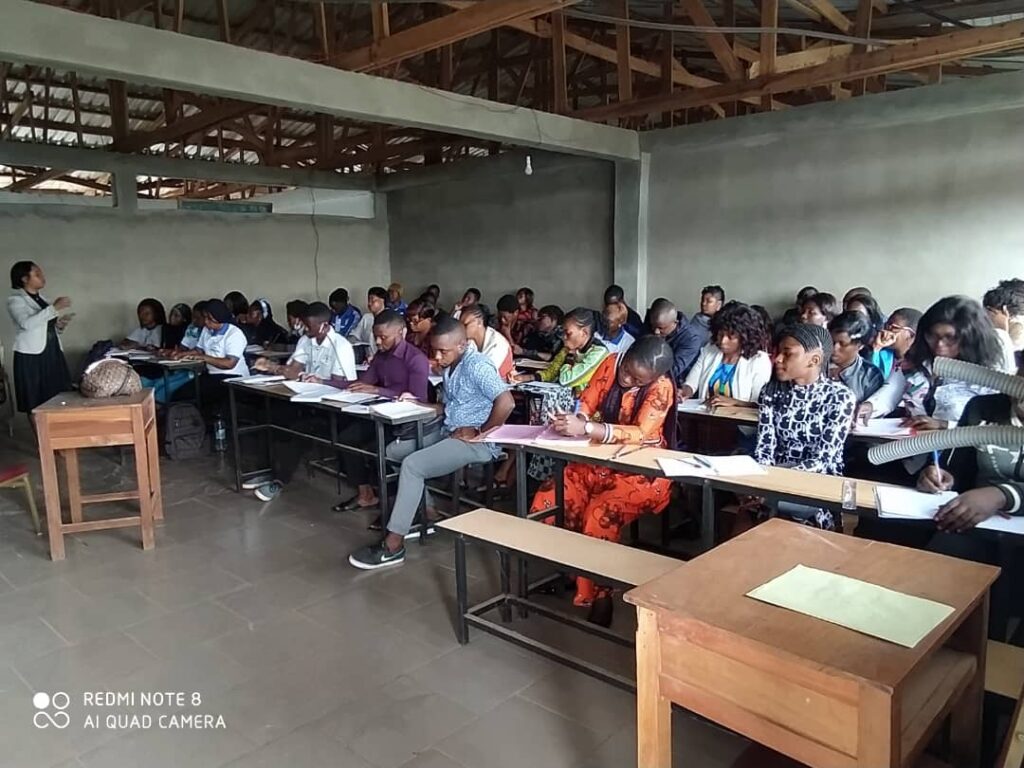
Assistant Manager
The Objective of the Training
This specialty, which replaces the HND and DEGREE in “Secretarial studies “trains the collaborators of General, managers, Directors of units, or heads of service. Organized, rigorous, dynamic, and discreet, they assist, facilitate, and follow the work. The Assistant Manager mainly plays the role of interface and mediation between the company and its environment. He is in charge of following up on administrative activities, communication, organization of work, and deciding and can even support a specialized file or organize an event.
- Control the economy of organizations
- Master several languages
- Have negotiation skills
- Understand the professional environment
- Be able to work under pressure
- Demonstrate adaptability and maturity.
- Participate in the organization and management of the company
- Manage and deal with the flow of information to allow for decision-making
- Ensure the function of the relational interface
- Ensure the accounting and financial management of the company
- Master the different legal procedures
- Be courteous, reactive and well-organized
- Master drafting administrative.
- Assistant of managers
- Assistant of directors
- Administrative Assistants
- Sales assistant
- Public relations assistant
- Assistant of human resources
- Office manager.
Human Resouce Management
The Objective of the Training
The objective of this specialty is to train specialists in the administrative follow-up of the personnel (contracts, absences, leaves, medical visits, declarations to labor organizations) and offer refreshment courses in line with the labor code; the regulation of work, and the human resource policy of the enterprise.
- Understand the professional and economic environment and
enterprises - Master the use of the computer
- Administer individual salary files
- Effect declarations dictated by law
- Identify the need for training of the personnel
- Define the need for training
- Inform the personnel on the labor code and the peculiarities of the enterprise
- Lead a work team
- Control the pay vouchers of the personnel
- Establish pay slips
- Carry out the administrative follow-up of human resources operations
- Carry out interview given employment
- Follow up outsources service contracts
- Assistant Human Resource Manager
- Assistant to the person in charge of Human Resources
- Assistant to the Directorate
- Officer in charge of recruitment
- Manager of Salaries.


Project Management
The Objective of the Training
The objective of this specialty is to train technicians capable of leading projects of enterprises in all sectors (industrial, service, commercial, technological, and cultural), through the development of the enterprise and the acquisition of theoretical and practical knowledge in project management.
- Understand the professional and economic environment and enterprises
- Master the use of the computer
- Be apt in oral and written communication
- Be capable of team leadership
- Identify local, national and international partners
- Monitoring technological and competitive development
- Coordinate projects and carry out feasibility studies
- Define the operational objectives of the project
- Identify the working tools
- Prepare the technical file
- Identify the sources to exploit
- Analyze and summarize information found.
- Assistant project manager
- Assistant marketer
- Officer responsible for public relations
- Planner of the project.
Event Management
The Objective of the Training
The objective of this specialty is to train experts in the organization and management of logistics and transport in the local, regional and international markets, taking into account the complementary modes of transport and sustainable development. They will in this exercise have to master foreign languages, communication and negotiation techniques, management techniques, and optimizing flow of goods, management of warehouses, and the exploitation of urban transport network.
- Have knowledge of the social and national, regional and international economic environment
- Be rigorous in the organization of work, be proactive and creative
- Have knowledge of foreign languages (English and French)
- Can negotiate sales and after sales agreements.
- Ensure the piloting of a logistics chain
- Know a wide range of techniques linked to the use of the logistics
chain (storage, handling, workflow, transport, etc) - Facilitate and coordinate exchange between the internal stakeholders of the enterprise
- Contribute to the rapid resolution of problems between suppliers and customers
- Manage change and promote solutions necessary for the adhesion of partners
- Have knowledge of marketing so as to identify the expectations of customers and strike a compromise between efficiency and quality in a context of competition
- Conceive adaptable structures, permanently interacting with the multiple environmental components
- Practice methods which are flexible and rational, to materialize the action and permit the regulation of flows through the development of a logistics system and good information networks.

Event Management
The Objective of the Training
The objective of this specialty is to train experts in the organization and management of logistics and transport in the local, regional and international markets, taking into account the complementary modes of transport and sustainable development. They will in this exercise have to master foreign languages, communication and negotiation techniques, management techniques, and optimizing flow of goods, management of warehouses, and the exploitation of urban transport network.
- Have knowledge of the social and national, regional and international economic environment
- Be rigorous in the organization of work, be proactive and creative
- Have knowledge of foreign languages (English and French)
- Can negotiate sales and after sales agreements.
- Ensure the piloting of a logistics chain
- Know a wide range of techniques linked to the use of the logistics
chain (storage, handling, workflow, transport, etc) - Facilitate and coordinate exchange between the internal stakeholders of the enterprise
- Contribute to the rapid resolution of problems between suppliers and customers
- Manage change and promote solutions necessary for the adhesion of partners
- Have knowledge of marketing so as to identify the expectations of customers and strike a compromise between efficiency and quality in a context of competition
- Conceive adaptable structures, permanently interacting with the multiple environmental components
- Practice methods which are flexible and rational, to materialize the action and permit the regulation of flows through the development of a logistics system and good information networks.


Logistics and Transport Management
The Objective of the Training
- Have knowledge in accounting and finance management as well as
management control (more centered on tools for rapid control of the accounting methods) - Know the tools necessary for optimizing the quality and security of physical and information flows
- Provide for performing alternatives in case of disruption of the current flows
- Be capable of using specific software, contribute to making a choice for the enterprise, and facilitate their use
- Manager of transport units
- Inventory Manager
- Warehouse Manager
- Stock Control and Store Keeper
- Purchasing Manager
- Logistics Engineer
- Supply Chain Manager
- International Logistics Manager
- Logistics Consultant
- Transport and logistics service provider
- Authorized customs agent
- Controller of SGS
- Import and Export Agent
- Intermediate staff members of the Maritime Administration
- Port Officials/Administrators
- Shipping Line Personnel
- Shipping Agency Personnel
- Maritime Controllers
- Ship Brokers
- Customs Brokers
- Consolidators
- Maritime/Shipping Teachers
- Marine Insurance Officials/Personnel
- Customs Officials
- Logistics Officers
- Transport Officers
- Supply chain Officers
- Commercial Managers
- Freight Managers
- Delivery Officers
- Terminal Operators
Management of Non Governmental Organizations
The Objective of the Training
The objective of this specialty is to produce technicians having good knowledge of analyses of the stakes of NGOs, the understanding and use of management techniques, the conception and follow-up of projects, and negotiation with partners.
- Understand the professional and economic environment and enterprises
- Master the use of the computer
- Be apt in oral and written communication
- Be capable of team leadership.
- Lead a project for the creation of an NGO.
- Master the analyzing and evaluation tools of projects.
- Mount and manage NGO development projects.
- Participate in the preparation of NGO action plans (preparation of the rules, and orientation and harmonization of their orientation.
- Put in place the means necessary for the accomplishment of the administrative action (defining the mission, programmers and scheduling; management of subventions and financial assistance).
- Give an account of the conduct of the work to hierarchy.
- Update his knowledge and follow up the evolution of regulatory and
legislative instruments in the domain.
The holder of the HND/DEGREE should be able to:
- Identify the principal components of a project in the domain
and the roles involved - Evaluate the charges and arrange the scheduling of an NGO.
- Construct and follow up the budgetary plan of an NGO.
- Follow up and master NGOs.
- Administrative officer of NGOs
- Collaborator to the head of a project
- Assistant to the head of a cooperation and development mission


LOCAL Government ADMINISTRATION
The Objective of the Training
The objective of this specialty is to train people who will be able to advise and assist local government officials on local politics and policies and how they should be implemented within the framework of the law.
- Lead a team
- Master managerial techniques
- Have writing skills
- Can speak English and French
- Be capable of working in a team or independently.
- Participate in the elaboration of the budget of a local government.
- Accompany a project in its legal, financial, “human resources”
“evaluation”, and “NIT” aspects. - Take care of the public procurement policy of the local government
within the framework of public procurement. - Develop and optimize a policy by which local governments are
covered by insurance. - Participate in the recruitment of new staff, management of jobs and skills, and control of payroll.
- Understand the impact of NIT on the organizations and their partners
- Initiate NIT in a local government.
- Conceive and put in place management tools for local
governments..
- Manager of transport units
- Inventory Manager
- Warehouse Manager
- Stock Control and Store Keeper
- Purchasing Manager
- Logistics Engineer
- Supply Chain Manager
- International Logistics Manager
- Logistics Consultant
- Transport and logistics service provider
- Authorized customs agent
- Controller of SGS
- Import and Export Agent
- Intermediate staff members of the Maritime Administration
- Port Officials/Administrators
- Shipping Line Personnel
- Shipping Agency Personnel
- Maritime Controllers
- Ship Brokers
- Customs Brokers
- Consolidators
- Maritime/Shipping Teachers
- Marine Insurance Officials/Personnel
- Customs Officials
- Logistics Officers
- Transport Officers
- Supply chain Officers
- Commercial Managers
- Freight Managers
- Delivery Officers
- Terminal Operators
Management of Non Governmental Organizations
The Objective of the Training
The objective of this specialty is to produce technicians having good knowledge of analyses of the stakes of NGOs, the understanding and use of management techniques, the conception and follow-up of projects, and negotiation with partners.
- Have general knowledge of the national, regional and international social and economic environment
- Demonstrate rigor in the organization of work and a capacity for responsiveness and creativity
- Have a general knowledge of foreign languages, English in particular
- Have the sense of negotiation, commercial relations and sales, as well as after-sales.
- Ensure the management of a logistic chain, especially maritime logistic chains.
- Know a wide range of techniques related to the logistic chain (warehousing, handling, transit, production, transport, etc.).
- Facilitate and coordinate the exchange between the internal actors of a maritime company.
- Contribute to the quick resolution of problems between stakeholders of the shipping industry.
- Manage change and promote solutions necessary for the adhesion of partners.
- Design adaptable structures, in permanent interaction with the multiple components of the environment.
- Implement methods that are both flexible and rational, to materialize its action and allow the regulation of flows through the development of a shipping logistics system and efficient information networks.
- Have knowledge of accounting and financial management as well as management control (more focused on real-time control tools than on accounting methods).
- Know the tools needed to optimize the quality and safety of physical and information flows.
- Provide efficient alternatives in the event of disturbances of current flows.
- To be able to use specific software, to contribute to their choice by the company and to favor their exploitation.
- Managing a work team.
- Intermediate staff members of the Maritime Administration
- Import & Export Agents
- Port Officials/Administrators
- Shipping Lines/Agency Personnel
- Maritime Controllers / Brokers
- Customs Brokers / Customs approved agent
- Maritime/Shipping Teachers
- Marine Insurance Professionals
- Freight forwarder and logistics provider
- Commercial agents
- Terminal Operators

